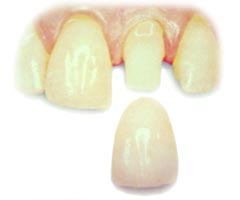Getting the Shine and Color Back in My Dental Crown
I had a crown placed on a lateral incisor. It was fine for the first seven months. Now, it has lost its shine and has started to pick up stains. I was hoping to get it back the way it was. Will teeth whitening take care of the color and shine or will I need a separate procedure for each thing?
Callie Anne
Dear Callie Anne,
I am sorry this happened to you. Unfortunately, teeth whitening will do neither of the things you are hoping for. It only works on natural tooth structure so it won’t do anything for your porcelain crown. What protects a dental crown from stains and also gives it that shine is the protective glaze placed on it. It sounds like something removed yours.
Given the timing you mentioned, that was enough time for you to have a dental cleaning. If you did, I suspect that your dental hygienist may have used something like a power prophy jet or acidulated fluoride during your appointment. The first will remove your glazing entirely. The second will etch it which could make it look more dull and cause it to pick up stains as well, just not as quickly.
If your hygienist did that, then I would say they need to bear the responsibility to replace your dental crown and the dentist will need to do some training with his staff on protecting dental work.
If that is not what happened, I would make sure you are not using anything like a whitening toothpaste. Almost all of these “whiten” your teeth by using an abrasive, which damages both the glazing on your crown as well as your natural tooth enamel. The only whitening toothpaste I know of that is safe for dental work is Supersmile toothpaste.
No matter what the cause, the solution would be to replace the dental crown. It’s only been seven months, so I do think the dentist should take this.
This blog is brought to you by Douglas, AZ Dentist Dr. Gilberto Tostado.
Read More...Dental Crown Keeps Falling Off
I need some advice. My dental crown has fallen off three times. After the third time I went back to have it rebonded on, he tells me that I need a gingivectomy in order to have more tooth to bond the crown to. I am concerned about that. Plus, there is a blackened part of the tooth that wasn’t that way the last time the crown fell off. I have to make a decision soon. What do you recommend?
Beth
Dear Beth,
While sometimes this procedure, called crown lengthening, is necessary, your dentist should have known this BEFORE placing the first crown. The fact that he did not and just mentioned it after the third time his crown failed, makes me think that he is just using that as an excuse.
If the dentist has the skill, it is possible to do a porcelain crown on a short tooth, if that is an actual issue for you and not just your dentist’s excuse. It’s a bit tricky. the tooth has to have only a slight taper and in some cases there will need to be grooves cut into the sides. Most dentists go their whole career without a crown falling off even once, let alone three times.
It is only when the natural tooth is so far gone that there is too little tooth left to support that crown that crown lengthening is ever truly needed.
My suggestion is that you find a different dentist in this particular case. I do not think he is the best dentist for you. Instead, I would ask for a full refund. He should also refund the insurance company, if you used any dental insurance for this procedure. Then, find a different dentist to place your dental crown.
This blog is brought to you by Douglas, AZ Dentist Dr. Gilberto Tostado.
Read More...Failed dental crown: Is my dentist responsible?

A few months later, I had to come in to get another tooth crowned, but I wanted my dentist to look at the painful tooth that he had crowned last time. It was still so painful that I couldn’t bite on it. He made some adjustments to my crown, but it was still sensitive no matter what we tried. The dentist kept pushing me to get that second crown, but I didn’t want to move forward with any new treatment until I got relief from the pain.
The office scheduled me for another appointment to try adjusting the crown again, but it got postponed a few times due to the pandemic. When they finally were able to see me the other day, I learned that my tooth now has a periapical abscess. I plan to get it pulled, but my dentist wants to charge me for the extraction on top of what I already paid for the failed crown.
This whole experience has been so frustrating and painful. If I knew how severe the damage was, I would have opted to pull that tooth months ago. I feel like my dentist owes me a refund for this failed crown and for the pain I’ve had to endure for months.
Is this my dentist’s fault? Why didn’t they tell me at the start that I would need a root canal or extraction? I’d like to know if I could get a refund.
— Tammy
Hello Tammy,
Based on what you’ve told us, we can understand just how frustrating your experience has been.
Your situation is a tricky one. There are signs that the dentist who placed your crown was a bit careless, but you may not have enough proof to allege malpractice or justify a refund.
Without reviewing your X-rays and dental records and hearing your dentist’s perspective, we can only guess at his rationale for crowning your cracked tooth.
Most dentists wouldn’t put a cap on a tooth that had sensitivity and showed signs of needing root canal treatment. And an ethical dentist wouldn’t ignore your pain in order to push the placement of a new crown.
It isn’t unusual for teeth to unexpectedly flare up and take a turn for the worse after being crowned. This is something that happens to even the most well-intentioned dentists, on occasion. So it’s possible that your dentist genuinely did not anticipate that your tooth would have such a severe reaction after being crowned.
It’s also possible that your dentist felt that urgent treatment was necessary to protect the second tooth from more serious damage. That could explain why it seemed your dentist was “pushing” you to get another crown, even though you weren’t yet happy with the first one.
All of this is to say that you may have a hard time proving that your dentist did anything wrong.
But this doesn’t mean that your feelings about the situation are wrong.
In fact, we can point out a few red flags worth noting:
- Your dentist, indeed, should have told you right from the start that there was a possibility you would need a root canal. The fact that he did not is concerning.
- Your dentist should not have dismissed your post-crown discomfort. A little temporary sensitivity to temperature changes is normal; pain while biting on your crown is not normal.
- When you returned months later with your first crowned tooth still causing you pain, your dentist should not have ignored that to move forward with placing a new crown. This suggests that the dentist could have been putting income ahead of patient concerns.
So in a nutshell, it appears that your dentist may have made some mistakes in judgment in your treatment, but you might have a difficult time getting compensated for that. You can try using some leverage to negotiate with your dentist for a refund on your failed crown. For example, you can complain to your state dental board or threaten to leave a negative review online. These tactics may only get you so far, however.
The best thing you can do at this point is to start looking for a new dentist.
The right dentist will take the time to answer your questions, will prioritize your comfort and concerns, and will carefully explain all of your treatment options before moving ahead with any procedure. Your new dentist can also help you weigh the pros and cons of treating a tooth with a root canal versus extracting it and replacing it with dental implants.
This post has been published on behalf of Dr. Gilberto Tostado, a dentist near Douglas, AZ.
Read More...

